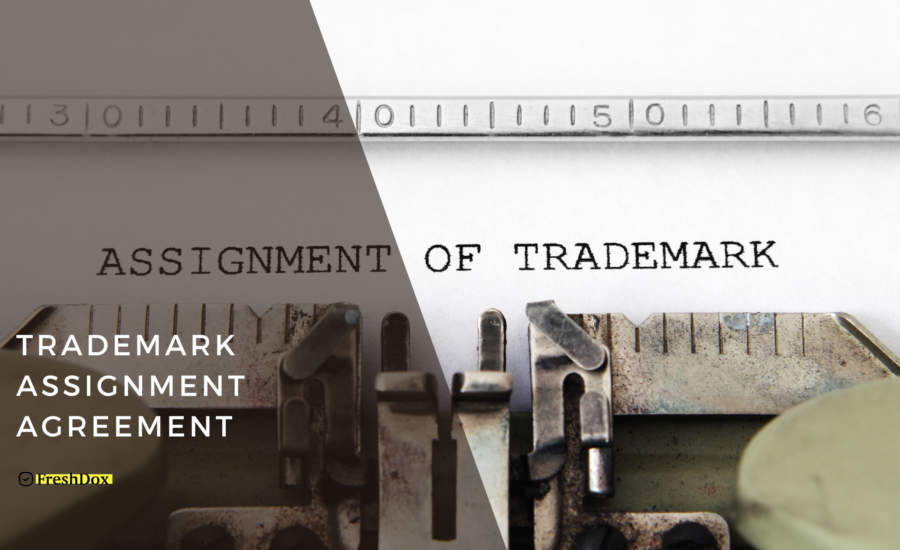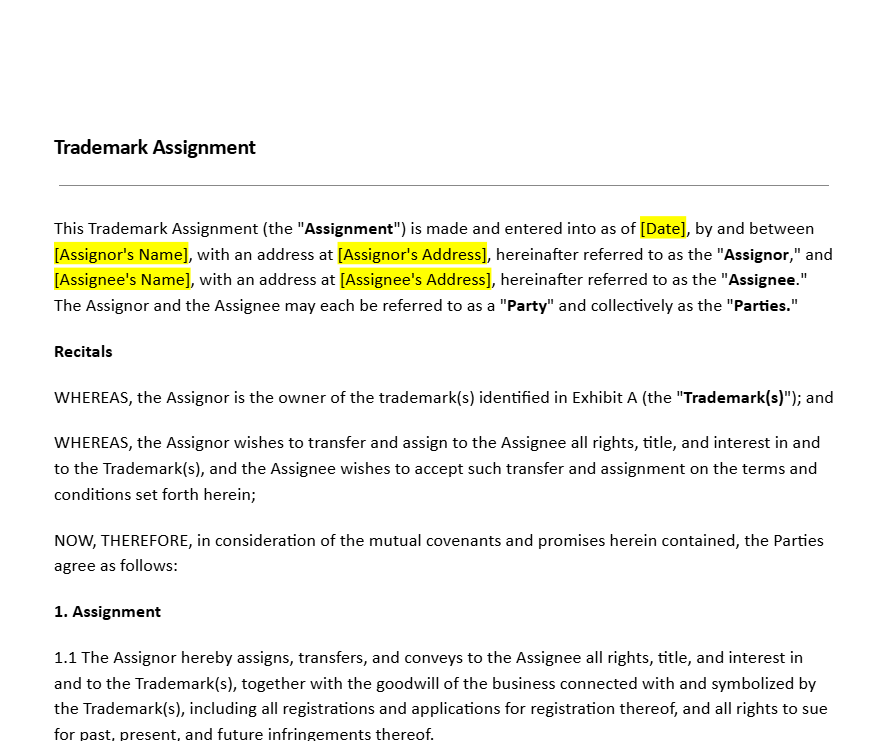
Trademark Assignment Template
7 Downloads
IP and Copyright
February 17, 2025
Sayantani Dutta
The assignment of a registered mark or an application for trademark registration is governed by the trademark assignment agreement. This contract enables a trademark owner (the assignor) to assign complete rights or partial interest in a mark to a party (the assignee).
In contrast to a trademark licensing agreement, under which a mark can be utilized by a third party under specific terms, an assignment of a trademark entails a perpetual transfer of ownership of a trademark’s ownership.
For firms acquiring existing brands, an assignment provides access to an established customer base, image, and marketing resources. Conversely, for a seller, marking can be a strategic step in restructurings, divestitures, or a consolidation of a business.
The law regulating such deals will be state-dependent, and individuals must adhere to laws within the state where the trademark is registered. Understanding the legal and procedural requirements for a trademark assignment helps protect property rights and intellectual property assets.
This article describes the purpose of such agreements and the terms and provisions that specify both parties’ rights and obligations.
What Is a Trademark Assignment?
A trademark assignment is a legal conveyance of ownership of a trademark from an assignor to an assignee, with the recipient becoming the sole owner and proprietor of the mark. The ownership of the trademark can pass with or without goodwill in a business, and it can affect how a mark continues to make an impression on consumers.
The trademark assignment agreement should define whether an outright assignment of the entire right is being conveyed, or if there are particular limitations. Assignments can be between entities, companies, or persons, and sometimes require updating registrations with governing bodies such as the United States Patent and Trademark Office (USPTO).
If the mark is unregistered, common law rights may be applicable, and diligent documentation will be necessary. To maintain its enforceability, an assignment must comply with all relevant laws and must be duly filed with the concerned authorities.
Where Is a Trademark Assignment Applied?
Businesses across industries rely on trademark assignments for a variety of strategic, legal, and financial reasons. In mergers and acquisitions of corporations, ownership of a trademark ensures complete ownership of a brand name, logo, and market presence for the buyer. Without this trademark assignment agreement, legal disputes may arise with respect to ownership of the trademark and right of use, leading to delayed business transactions or expensive litigation.
Trademark assignments are also performed by companies during portfolio restructurings. A business divesting a product line may assign related trade names and trademarks to a separate entity to maintain brand continuity. Similarly, startups purchasing renowned trademarks enjoy immediate name recognition, with accelerated market access.
In franchising, a trademark agreement can initially grant use rights, but when full ownership is acquired by franchisees, a trademark assignment brings about full transfer of ownership. International assignments require compliance with laws in a variety of countries, including filings with national trademark offices and compliance with laws in target countries for transfers of property rights.
Key Provisions and Terms in a Trademark Assignment
The timeline for completing the trademark assignment agreement will depend on a variety of factors, including jurisdiction, regulators’ requirements, and structural complexity. A straightforward assignment, with both parties in agreement and with proper execution of the legal document, can occur in a matter of a few weeks.
If filing with the United States Patent and Trademark Office (USPTO), processing can vary, with recording of the document taking several months. Assignments involving a dispute over title to your trademark, or an international trademark, can extend the process even further.
Ensuring the agreement incorporates all terms of this agreement, such as effective date, warranties, and information regarding compliance with laws, helps in minimizing delays. Proper documentation, such as notarization when applicable, and timely filing of documents are critical in completing the transfer in an efficient manner.
Let’s examine what to incorporate in essential provisions of this trademark assignment agreement.
Identification of the Parties
A trademark assignment agreement will have to state the assignee and trademark owner’s legal entities. This consists of a full legal name, a business entity, and a full address. If the assignor is assigned in a corporate transaction, additional disclosures about assignor’s right and authority to sign the agreement will sometimes be required.
Description of the Trademark
The contract must contain a proper description of the registered trademark or trademark application. This part should include the filing date, registration number, and country in which the mark is registered. If more than one mark is being transferred, a list of all the trademarks being assigned should be included as an exhibit. Unregistered marks under protection at common law have to be defined in detail, including commercial use and geographical location.
Scope of the Assignment
The contract will have to state whether the entire right to use the mark is being granted or whether the assignment is being restricted to specific territories, industries, or product categories. In some cases, an assignor can maintain certain rights, with use under restricted terms. If the assignment is not full, restrictions must be clarified to avert clashes in branding and presence in the marketplace. For additional clarification, you may refer to the FAQs section of related legal resources for common concerns regarding ownership of the trademark and property rights.
Goodwill of the Business
A trademark assignment may include or omit goodwill of business concerning the mark. If so, the assignee takes over the brand’s reputation, customer relations, and related marketing advantages. If excluded, the assignee will have access to the mark’s rights but will have to develop its presence in the marketplace independently. Courts have ruled that a lack of assignment of goodwill of a business in a trademark assignment can make such an assignment ineffective in some jurisdictions.
Consideration and Payment Terms
Assignments often involve payment in terms of value, termed valuable consideration. The contract should contain the purchase price, or any other forms of consideration, such as equity stakes and licensing arrangements. Payment schedules, installment payment terms, and payment completion-related contingencies have to be spelled out to prevent any dispute.
Assignor’s Representations and Warranties
The assignor must ensure that they have a legal right to assign the mark and that no encumbrances, liens, or claims stand in their way. Granting warranties regarding the validity of a trademark and assignability of such a trademark by its owner keeps at bay the legal claims of third parties. Any known and potential conflicts regarding the mark must be disclosed to the assignee before execution.
Recordation and Legal Compliance
An assignment agreement for a trademark must comply with the trademark laws of the relevant jurisdiction. For assignments about the United States Patent and Trademark Office (USPTO), the agreement must be documented to record updated ownership in databases of record. Some jurisdictions, including the US Patent and Trademark Office, require notarization via a notary public for verification of the transfer. Failure to record can complicate court cases when seeking to enforce trademark rights.
Governing Law and Dispute Resolution
A trademark assignment agreement should include the governing law that will apply to the interpretation and enforcement of the contract. The laws of the state in whose register a mark is registered will normally apply, but the parties can choose an alternative jurisdiction for commercial reasons. This section also sets out how conflicts will be resolved, naming mediation, arbitration, or court cases as preferred resolution channels.
Severability and Amendments
A severability clause maintains the enforceability of the agreement in the event that one of its terms is found to be invalid, the other terms will not fall away. The agreement should have a clause that any change regarding the terms of the agreement must be in written form and signed by both parties. Without this safeguard, future changes could become sources of contention between parties.
Execution and Effective Date
The last section states when the assignment has effect, and when new ownership of the mark becomes legally effective. The agreement becomes effective once the assignee and assignor have signed the contract. A formal closing statement and witness whereof confirms execution.
How to Prepare and Record a Trademark Assignment
Creating a trademark assignment agreement entails a high degree of legal accuracy, work is often necessitated in an attempt to adapt the terms and provisions to the nuance of specific transactions.
When completed, it must be signed and filed with the applicable trademark office, and the USPTO offers an electronic filing system. Engaging a law firm to administer the process can avoid conflicts and alleviate potential compliance issues.
Legal advice guides parties through complex structures of ownership, tax consequences, and contractual terms. Non-compliance with procedural requirements can lead to delays, and question the validity of the assignment.
Why You Need a Professional Template for the Task
As trademark rights form such a crucial role in business operations, ensuring that all the legal, financial, and procedural elements are properly documented is essential. Any misstep in preparing and entering into a trademark assignment agreement can result in disputes, invalidity in transfers, and compliance issues with governing bodies such as the USPTO.
Using a high-quality template when drafting the agreement keeps it uniform and accurate, lessening the risk of errors or omissions that generate legal vulnerabilities. A professionally crafted template simplifies documentation, conserves time, and facilitates easier recordation with trademark offices, with reduced administration lags.
Whether you’re dealing with partial transfers or complex brand acquisitions, a good template can serve as a solid foundation for creating a legally valid agreement.
Download a Free Trademark Assignment Template from FreshDox
Sign up for a free 7-day trial of a Premium or Basic account with FreshDox and get instant access to our Trademark Assignment Template. Our templates for business are designed by professionals for professionals. You get a completely customizable template to edit to your requirements and download in Word or PDF formats. Sign up for your free trial and browse our catalog with no obligation to subscribe, and no financial risk.
Related Templates
Discover more templates that align with your needs and preferences.

Ready to Sign Up?
Sign up for FreshDox.com’s 7-day trial and discover why so many individuals and businesses trust us for their legal document template needs.
- Cancel any time
- 7-day free trial
- From 300+ Customer Reviews
















